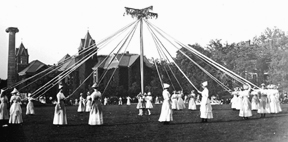May 1
I was taught in elementary school that we didn’t celebrate May Day anymore because it was a Communist holiday.
Not only was this a lame excuse not to celebrate a holiday, it also wasn’t true.
In ancient and medieval Europe, seasons were determined not by equinoxes and solstices, but by the days that fell directly in between, known as “cross-quarter days.” The first cross-quarter day of the year is Groundhog Day or Candlemas, between winter solstice and spring equinox. The second is today, May Day, which once marked the beginning of summer.
May Day traditions such as creating floral wreaths date back to the Romans and Celts (Beltane), and survived well into the 20th century, including dancing around the Maypole and crowning a ‘May Queen.’
In the 19th century May Day became a standard date for workers to re-negotiate contracts with employers. One reason may be because it was one of the few days off workers had that wasn’t a Sunday (church day) or a religious holiday. Thus, as communities got together to celebrate, the workers–usually the fathers of the family–could also unite for better wages or working conditions.
Over time May Day was adopted by (or hijacked by, depending on your politics) communist, socialist and labor groups. May Day fell out of favor in the U.S. where the first of May is celebrated with other, more patriotic holidays, including:
- Law Day
- Loyalty Day
- National Day of Prayer (1st Thursday in May)
and the more casual
- Lei Day.
Lei Day is, believe it or not, the oldest of those four holidays. It’s the Hawaiian version of May Day, dating to the 1920s. Loyalty Day, Law Day, and National Day of Prayer were officiated in the 1950s under Presidents Truman and Eisenhower.
In the United States, Labor Day is celebrated on the first Monday in September.
Even though May Day was seen as a communist import in America, it was in Chicago, Illinois, that May Day gained notoriety as a day for workers and eventually became the international holiday known as Labour Day.
Oh, and the distress call ‘Mayday! Mayday!‘ has nothing to do with the holiday. It’s from the French venez m’aider, meaning ‘come help me.’

